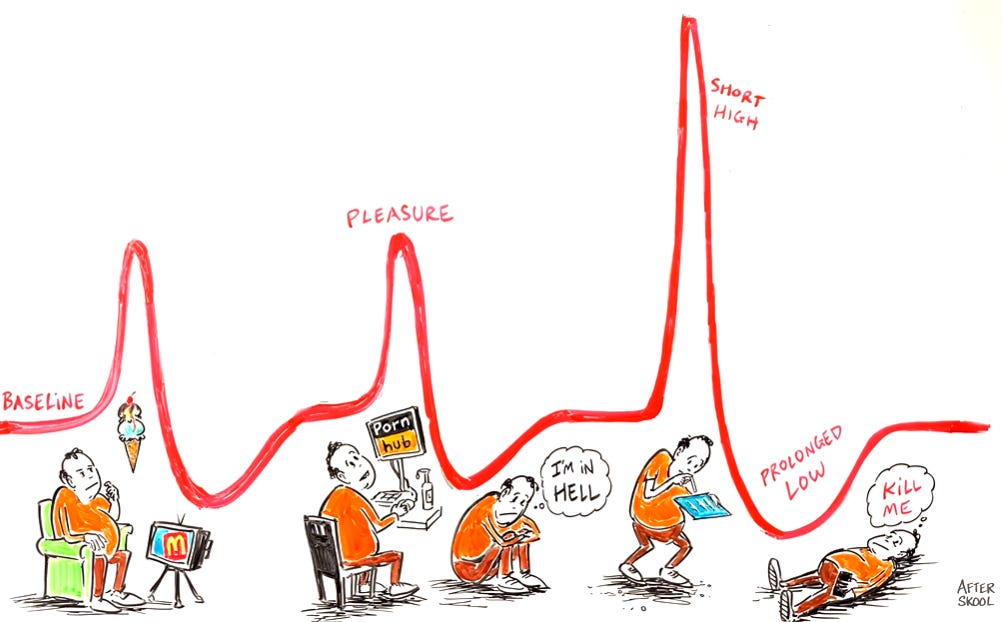Emotional well-being is produced in our body due to how we use dopamine. That is the hormone of drive. To understand more the nature of dopamine, let’s think of the behavioral processes it is involved.
Important Concepts Explored
Mind: The faculty of conciousness and thought.
Matter: An organ contained in the skull of vertebrates focused on processing and executing nervous activity.
Addictive Process
A person has a dopamine baseline on its brain — that is, the normal amount of dopamine available in the brain. When a person has a high expectation of pleasure such as what happens with drugs, junk food, etc. The dopamine production rises as time goes on and reaches its peak when the activity happens. Afterwards, however, the dopamine amount in the brain goes bellow baseline which is translated on less drive to do other activities for a prolonged period of time. (Fig. 1)
Since your hippocampus helps you recall memories, it contributes to the desire of that dopaminergic activity / rewarding stimulus. If a person seeks dopamine peaks, the hormone of drive is going to start rising to incentivize you to pursue the action that makes high levels of momentary pleasure occur.
Therefore, individuals become addicted by positive reinforcement: the process of encouraging a behaviour by offering reward when the behaviour is exhibited (Oxford Languages). As the reward is so strong, the positive reinforcement has a huge effect over time. Individuals, as they seek more and more dopamine peaks, have more prolonged lows. Which results in less supply of dopamine that could be useful to pursue other things that are healthy and desired by the mind: education, productivity, etc.
Living pursuing things that the “matter” desires conduces to an uncontrolled life since individuals become victims of pleasure: the things they are predisposed to do biologically get narrower and narrower to the activities that generate the highest dopamine peaks (drugs, porn, junk food, etc.)
Healthy Process
Until now, we have seen how dopamine can be used as a driving force to act based on matter. But, there is a way to use this hormone to act in accordance to the mind. Specifically, a wise mind. Take a look at the following graph and pay attention to the differences between a addictive and healthy process.
Individuals that pursue goals where the mind leads the brain/matter have a higher dopamine baseline than the ones on which the brain leads the mind. And, while, the activities that our mind desires might not be as dopaminergic for a moment as the ones that our matter wants, they provide more dopamine after they occur and on average. Moreover, even when doing the activities you feel satisfied because you are acting in accordance to yourself. You feel more freedom as you take control and act towards what you truly aspire for yourself.
In that sense, while the activities showed are mainly physical, you can also experience the same phenomenom by performing a cognitive task or having a good diet. It might not be as enjoyable, in terms of pleasure of the matter, but it will lead to satisfaction, freedom, and good levels of dopamine.
What to do?
You should pursue wisdom. That is to pursue the correct goals and think of the right ways to achieve them. Moreover, wisdom should not only live in abstraction but you should transform your ideals into actions: a wise mind should lead the matter.
For well-being to be eternal, that is to be happy, the independent variables that lead to it should not decrease. If you try to find happiness in external things, you will fail, as the world is always changing for good or for bad. If you try to find happiness in the pleasure of the matter, you will fail, as that will lead to an unhealthy dopamine cycle.
So, to be happy, you should live in accordance to the greatness of thought and the quality of decision-making. And, even if your ideals evolve for a wise reason, you shall accept the shift and not see your past self with resentment, but rather with content for having grown. You will feel proud by having that mentality and, as your mind seeks wisdom (independent variable), which is also expressed in progress, you will be happy forever: by acting following a wise mind.
Works Cited
Huberman, Andrew. [After Skool]. (2022, May 24). How to Maximize Dopamine & Motivation - Andrew Huberman [Video file]. Retrieved from
Simply Psychology. (2023, September 14). Brain Reward System. Simply Psychology. https://www.simplypsychology.org/brain-reward-system.html





